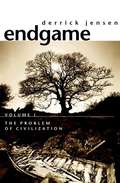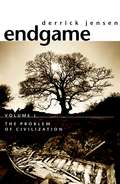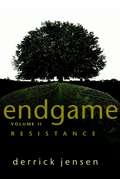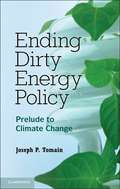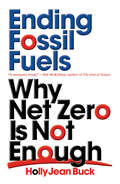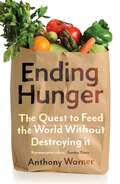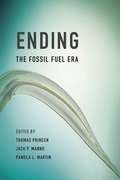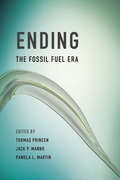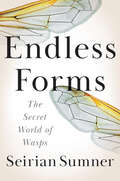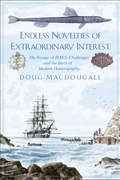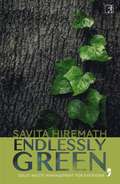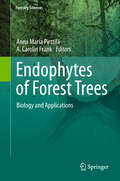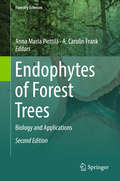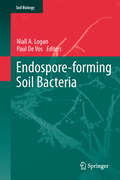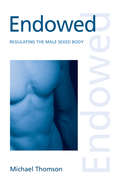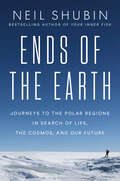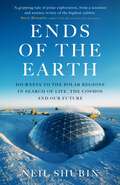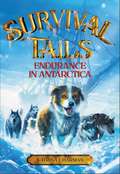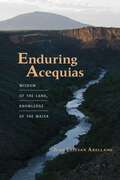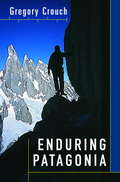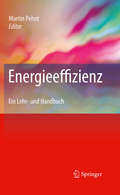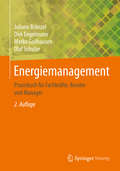- Table View
- List View
Endgame, Volume 1: The Problem of Civilization
by Derrick JensenEndgame, Volume 1 builds on a series of simple but increasingly provocative premises: for example, "The needs of the natural world are more important than the needs of any economic system" and "Love does not imply pacifism." A brilliant weaving together of piercing analysis and elegant prose, Endgame leads us to see that we can re-imagine our world. Derrick Jensen is the acclaimed author of A Language Older Than Words and The Culture of Make Believe, among many others. Author, teacher, activist, small farmer, and leading voice of uncompromising dissent, he regularly stirs auditoriums across the country with revolutionary spirit. Jensen holds a degree in creative writing from Eastern Washington University, a degree in mineral engineering physics from the Colorado School of Mines, and has taught at Eastern Washington University and Pelican Bay State Prison.
Endgame, Volume 1: The Problem of Civilization
by Derrick JensenThe long-awaited companion piece to Derrick Jensen's immensely popular and highly acclaimed works A Language Older Than Words and The Culture of Make Believe. Accepting the increasingly widespread belief that industrialized culture inevitably erodes the natural world, Endgame sets out to explore how this relationship impels us towards a revolutionary and as-yet undiscovered shift in strategy. Building on a series of simple but increasingly provocative premises, Jensen leaves us hoping for what may be inevitable: a return to agrarian communal life via the disintegration of civilization itself.
Endgame, Volume 2: Resistance
by Derrick JensenWhereas Volume 1 of Endgame presents the problem of civilization, Volume 2 of this pivotal work illustrates our means of resistance. Incensed and hopeful, impassioned and lucid, Endgame leapfrogs the environmental movement's deadlock over our willingness to change our conduct, focusing instead on our ability to adapt to the impending ecological revolution.
Ending Dirty Energy Policy
by Joseph P. TomainClimate change presents the United States, and the world, with regulatory problems of a magnitude, complexity and scope unseen before. The United States, however, particularly after the mid-term elections of 2010, lacks the political will necessary to aggressively address climate change. Most current books focus on climate change. Ending Dirty Energy Policy argues that the US will not adequately address climate change until it transforms its fossil fuel energy policy. Yet there are signs that the country will support the transformation of its century-old energy policy from one that is dependent on fossil fuels to a low-carbon energy portfolio. A transformative energy policy that favors energy efficiency and renewable resources can occur only after the US has abandoned the traditional fossil fuel energy policy, has redesigned regulatory systems to open new markets and promoted competition among new energy providers, and has stimulated private-sector commercial and venture capital investment in energy innovations that can be brought to commercial scale and marketability.
Ending Fossil Fuels: Why Net Zero is Not Enough
by Holly Jean BuckEnding the fossil fuel industry is the only credible path for climate policyAround the world, countries and companies are setting net-zero carbon emissions targets. But what will it mean if those targets are achieved? One possibility is that fossil fuel companies will continue to produce billions of tons of atmospheric CO2 while relying on a symbiotic industry to scrub the air clean. Focusing on emissions draws our attention away from the real problem: the point of production.The fossil fuel industry must come to an end but will not depart willingly; governments must intervene. By embracing a politics of rural-urban coalitions and platform governance, climate advocates can build the political power needed to nationalize the fossil fuel industry and use its resources to draw carbon out of the atmosphere.
Ending Hunger: The quest to feed the world without destroying it
by Anthony WarnerNutritionists tell you to eat more fish. Environmentalists tell you to eat less fish. Apparently they are both right. It's the same thing with almonds, or quinoa, or a hundred other foods. But is it really incumbent on us as individuals to resolve this looming global catastrophe? From plastic packaging to soil depletion to flatulent cows, we are bombarded with information about the perils of our food system. Drawing on years of experience within the food industry, Anthony Warner invites us to reconsider what we think we know. In Ending Hunger, he uncovers the parallels between eating locally and 1930s fascism, promotes the potential for good in genetic modification and dispels the assumption that population growth is at the heart of our planetary woes.
Ending the Fossil Fuel Era
by Thomas Princen Pamela L. Martin Jack P. MannoNot so long ago, people North and South had little reason to believe that wealth from oil, gas, and coal brought anything but great prosperity. But the presumption of net benefits from fossil fuels is eroding as widening circles of people rich and poor experience the downside.A positive transition to a post-fossil fuel era cannot wait for global agreement, a swap-in of renewables, a miracle technology, a carbon market, or lifestyle change. This book shows that it is now possible to take the first step toward the post-fossil fuel era, by resisting the slow violence of extreme extraction and combustion, exiting the industry, and imagining a good life after fossil fuels. It shows how an environmental politics of transition might occur, arguing for going to the source rather than managing byproducts, for delegitimizing fossil fuels rather than accommodating them, for engaging a politics of deliberately choosing a post-fossil fuel world. Six case studies reveal how individuals, groups, communities, and an entire country have taken first steps out of the fossil fuel era, with experiments that range from leaving oil under the Amazon to ending mountaintop removal in Appalachia.
Ending the Fossil Fuel Era
by Thomas Princen Pamela L. Martin Jack P. MannoNot so long ago, people North and South had little reason to believe that wealth from oil, gas, and coal brought anything but great prosperity. But the presumption of net benefits from fossil fuels is eroding as widening circles of people rich and poor experience the downside.A positive transition to a post-fossil fuel era cannot wait for global agreement, a swap-in of renewables, a miracle technology, a carbon market, or lifestyle change. This book shows that it is now possible to take the first step toward the post-fossil fuel era, by resisting the slow violence of extreme extraction and combustion, exiting the industry, and imagining a good life after fossil fuels. It shows how an environmental politics of transition might occur, arguing for going to the source rather than managing byproducts, for delegitimizing fossil fuels rather than accommodating them, for engaging a politics of deliberately choosing a post-fossil fuel world. Six case studies reveal how individuals, groups, communities, and an entire country have taken first steps out of the fossil fuel era, with experiments that range from leaving oil under the Amazon to ending mountaintop removal in Appalachia.
Ending the Fossil Fuel Era (The\mit Press Ser.)
by Thomas Princen Pamela L. Martin Jack P. MannoA provocative call for delegitimizing fossil fuels rather than accommodating them, accompanied by case studies from Ecuador to Appalachia and from Germany to Norway.Not so long ago, people North and South had little reason to believe that wealth from oil, gas, and coal brought anything but great prosperity. But the presumption of net benefits from fossil fuels is eroding as widening circles of people rich and poor experience the downside.A positive transition to a post-fossil fuel era cannot wait for global agreement, a swap-in of renewables, a miracle technology, a carbon market, or lifestyle change. This book shows that it is now possible to take the first step toward the post-fossil fuel era, by resisting the slow violence of extreme extraction and combustion, exiting the industry, and imagining a good life after fossil fuels. It shows how an environmental politics of transition might occur, arguing for going to the source rather than managing byproducts, for delegitimizing fossil fuels rather than accommodating them, for engaging a politics of deliberately choosing a post-fossil fuel world. Six case studies reveal how individuals, groups, communities, and an entire country have taken first steps out of the fossil fuel era, with experiments that range from leaving oil under the Amazon to ending mountaintop removal in Appalachia.
Endless Forms: The Secret World of Wasps
by Seirian Sumner“A book that draws us in to the strange beauty of what we so often run away from.” — Robin Ince, author of The Importance of Being InterestedIn this eye-opening and entertaining work of popular science in the spirit of The Mosquito, Entangled Life, and The Book of Eels, a leading behavioural ecologist transforms our understanding of wasps, exploring these much-maligned insects’ secret world, their incredible diversity and complex social lives, and revealing how they hold our fragile ecosystem in balance.Everyone worries about the collapse of bee populations. But what about wasps? Deemed the gangsters of the insect world, wasps are winged assassins with formidable stings. Conduits of Biblical punishment, provokers of fear and loathing, inspiration for horror movies: wasps are perhaps the most maligned insect on our planet. But do wasps deserve this reputation?Endless Forms opens our eyes to the highly complex and diverse world of wasps. Wasps are 100 million years older than bees; there are ten times more wasp species than there are bees. There are wasps that spend their entire lives sealed inside a fig; wasps that turn cockroaches into living zombies; wasps that live inside other wasps. There are wasps that build citadels that put our own societies to shame, marked by division of labor, rebellions and policing, monarchies, leadership contests, undertakers, police, negotiators, and social parasites. Wasps are nature’s most misunderstood insect: as predators and pollinators, they keep the planet’s ecological balance in check. Wasps are nature’s pest controllers; a world without wasps would be just as ecologically devastating as losing the bees, or beetles, or butterflies.Wasps are diverse and beautiful by every measure, and they are invaluable to planetary health, Professor Sumner reminds us; we’d do well to appreciate them as much as their cuter cousins, the bees.
Endless Novelties of Extraordinary Interest: The Voyage of H.M.S. Challenger and the Birth of Modern Oceanography
by Doug MacdougallA gripping tale of exploration aboard H.M.S. Challenger, an expedition that laid the foundations for modern oceanography From late 1872 to 1876, H.M.S. Challenger explored the world’s oceans. Conducting deep sea soundings, dredging the ocean floor, recording temperatures, observing weather, and collecting biological samples, the expedition laid the foundations for modern oceanography. Following the ship’s naturalists and their discoveries, earth scientist Doug Macdougall engagingly tells a story of Victorian-era adventure and ties these early explorations to the growth of modern scientific fields. In this lively story of discovery, hardship, and humor, Macdougall examines the work of the expedition’s scientists, especially the naturalist Henry Moseley, who rigorously categorized the flora and fauna of the islands the ship visited, and the legacy of John Murray, considered the father of modern oceanography. Macdougall explores not just the expedition itself but also the iconic place that H.M.S. Challenger has achieved in the annals of ocean exploration and science.
Endlessly Green
by Savita HiremathEndlessly Green looks at the history, the science and the art of composting and sustainable waste management through a kaleidoscope of philosophical, moral and ethical intricacies. The author digs into her rich pool of experiential learnings and raw inputs gathered through a decade of research, legwork and fearless execution. This engaging field guide equips community volunteers, activists, students, SWM practitioners and professionals with practical inputs on segregation, composting and organic gardening/farming, making sustainability imaginable in a concrete jungle. In doing so, it helps individuals discover the possibilities of bringing about a change in their environment by engaging their own environmental sensibilities. Endlessly Green is an extraordinary celebration of things small and significant and the fight against waste, culminating in a replicable and scalable end-to-end solution.
Endlings: Fables for the Anthropocene (Forerunners: Ideas First)
by Lydia PyneAmid the historical decimation of species around the globe, a new way into the language of loss An endling is the last known individual of a species; when that individual dies, the species becomes extinct. These &“last individuals&” are poignant characters in the stories that humans tell themselves about today&’s Anthropocene. In this evocative work, Lydia Pyne explores how discussion about endlings—how we tell their histories—draws on deep traditions of storytelling across a variety of narrative types that go well beyond the science of these species&’ biology or their evolutionary history.Endlings provides a useful and thoughtful discussion of species concepts: how species start and how (and why) they end, what it means to be a &“charismatic&” species, the effects of rewilding, and what makes species extinction different in this era. From Benjamin the thylacine to Celia the ibex to Lonesome George the Galápagos tortoise, endlings, Pyne shows, have the power to shape how we think about grief, mourning, and loss amid the world&’s sixth mass extinction.
Endophytes of Forest Trees
by Anna Maria Pirttilä A. Carolin FrankFound in every plant species, the diversity of endophytic micro-organisms can be extremely high within different plant organs and tissue types. In trees, their ecological roles with respect to host tree can vary from latent pathogens or saprophytes to neutral commensalists and mutualists. Given their high diversity, and their bio-active nature, endophytes are currently being associated with a role in tree health against insect herbivores and fungal pathogens, as well as improving tree properties in phytoremediation. Meanwhile there is increasing interest in the potential of some tree endophytes as new sources of drug compounds. The first book on tree endophytes in several years, and containing contributions from leading authors in the field, this book provides an important reference text for professional researchers and advanced students.
Endophytes of Forest Trees: Biology and Applications (Forestry Sciences #86)
by Anna Maria Pirttilä A. Carolin FrankEndophytes are commonly known as microorganisms, mainly bacteria and fungi, which live inside plant tissues without inducing symptoms. Considering the long-lived trees, endophytes have a fundamental role in preparing their hosts to face extreme weather conditions, drought, heat, cold, and pathogen and herbivore attacks. The current knowledge clearly demonstrates the importance of endophytes in shaping the plant diversity in a forest. Endophytes have an important capacity for biocontrol of forest diseases. Considering endophyte diversity and the range of various compounds and enzymes they can produce, endophytes can be used for various biotechnological applications.
Endospore-forming Soil Bacteria
by Paul De Vos Niall A. LoganAerobic endospore-forming bacteria are found in soils of all kinds, ranging from acid to alkaline, hot to cold, and fertile to desert. It is well known that endospores confer special properties upon their owners and play dominant parts in their life cycles and dispersal, and much has been written about the spores, genetics, and economic importance of these organisms. Much has also been written about soil ecology, but there is a relative dearth of literature that brings together different aspects of the behaviour and characters of endospore-formers with their contributions to soil ecosystems. This Soil Biology volume fills that gap. Following chapters that describe the current classification of these organisms, that review methods for their detection and for studying their life cycles in soils, and that examine their dispersal, other chapters show that they are active and dynamic members of soil floras that interact widely with other soil inhabitants, with roles in nitrogen fixation, denitrification, and soil remediation.
Endowed: Regulating the Male Sexed Body
by Michael ThomsonFeminist legal scholars and health care lawyers have long engaged with law’s responses to the female reproductive body, especially on what the legal regulation of women’s reproductive lives can tell us about the broader relationship between law and gender. Acknowledging this work and building upon it, Endowed considers the interaction of law and ideas of male reproductivity. In particular, it seeks to uncover what these regulatory moments can tell us about contemporary ideas and ideals of masculinity and the male sexed body. Spanning topics such as male circumcision and the regulation of state access to Viagra, the book uncovers recurring motifs that define masculinity and the male body in the legal imagination. In looking to these understandings the book engages with broader questions regarding the relationship between law and gender and between masculinity and social organization.
Ends of the Earth: Journeys to the Polar Regions in Search of Life, the Cosmos, and Our Future
by Neil ShubinThe bestselling author of Your Inner Fish takes readers on an epic adventure to the North and South Poles to reveal the secrets locked in the ice about life, the cosmos, and our planet&’s future. Renowned scientist Neil Shubin has made extraordinary discoveries by leading scientific expeditions to the sweeping ice landscapes of the Arctic and Antarctic. He&’s survived polar storms, traveled in temperatures that can freeze flesh in seconds, and worked hundreds of miles from the nearest humans, all to deepen our understanding of our world. Written with infectious enthusiasm and irresistible curiosity, Ends of the Earth blends travel writing, science, and history in a book brimming with surprising and wonderful discoveries. Shubin retraces his steps on a &“dinosaur dance floor,&” showing us where these beasts had populated the once tropical lands at the poles. He takes readers meteor hunting, as meteorites preserved in the ice can be older than our planet and can tell us about our galaxy&’s formation. Readers also encounter insects and fish that develop their own anti-freeze, and aquatic life in ancient lakes hidden miles under the ice that haven&’t seen the surface in centuries. It turns out that explorers and scientists have found these extreme environments as prime ground for making scientific breakthroughs across a vast range of knowledge. Shubin shares unforgettable moments from centuries of expeditions to reveal just how far scientists will go to understand polar regions. In the end, what happens at the poles does not stay in the poles—the ends of the earth offer profound stories that will forever change our view of life and the entire planet.
Ends of the Earth: Journeys to the Polar Regions in Search of Life, the Cosmos, and our Future
by Neil ShubinFrigid, remote and inhospitable – the polar regions seem far removed from our everyday lives. But these seemingly isolated ice realms shape life on our planet far more than we realise, influencing everything from the climate to ocean health. They may even hold the secrets to the origins of the Earth. Taking an epic journey of discovery from pole-to-pole, ferrying between penguins and polar bears, Ends of the Earth reveals the polar regions as never before. Meeting with the leading physicists, climatologists, geologists, biologists and palaeontologists working in these extremes – often as eccentric as they are intrepid – Neil Shubin presents the compelling new science of the Arctic and Antarctic with characteristic verve and expertise.
Endurance in Antarctica (Survival Tails #2)
by Katrina CharmanA group of sled dogs race to survive a perilous journey across Antarctica in the exhilarating second installment of Survival Tails, perfect for fans of the Ranger in Time and I Survived series! <P><P>Sled dog Samson wants nothing more than to be part of Ernest Shackleton's historic voyage to Antarctica. <P><P>He wants to feel the snow under his paws and the wind on his face as he races across the ice fields, and most of all he wants to help his humans find eternal glory as they chart the continent. His fellow sled dog, Bummer, just wants to get through the voyage in one piece. Why would he want to face down a dangerous, icy wasteland when he could stay inside his kennel, warm and safe? <P><P>When their ship, the Endurance, becomes trapped in sea ice, leaving the dogs and men with no way home, their journey becomes not about personal glory, but about survival. Samson, Bummer, and the other dogs will have to put aside their differences and band together to rescue their humans...and themselves. <P><P>With engaging nonfiction back matter that delves into the fascinating true story behind the book, Survival Tails: Endurance in Antarctica is sure to keep readers entertained as the second entry in this series of action-packed animal adventures.
Enduring Acequias: Wisdom of the Land, Knowledge of the Water (Querencias Series)
by Juan Estevan ArellanoFor generations the Río Embudo watershed in northern New Mexico has been the home of Juan Estevan Arellano and his ancestors. From this unique perspective Arellano explores the ways people use water in dry places around the world. Touching on the Middle East, Europe, Mexico, and South America before circling back to New Mexico, Arellano makes a case for preserving the acequia irrigation system and calls for a future that respects the ecological limitations of the land.
Enduring Patagonia
by Gregory CrouchPatagonia is a strange and terrifying place, a vast tract of land shared by Argentina and Chile where the violent weather spawned over the southern Pacific charges through the Andes with gale-force winds, roaring clouds, and stinging snow. Squarely athwart the latitudes known to sailors as the roaring forties and furious fifties, Patagonia is a land trapped between angry torrents of sea and sky, a place that has fascinated explorers and writers for centuries. Magellan discovered the strait that bears his name during the first circumnavigation. Charles Darwin traveled Patagonia's windy steppes and explored the fjords of Tierra del Fuego during the voyage of the Beagle. From the novel perspective of the cockpit, Antoine de Saint-Exupry immortalized the Andes in Wind, Sand, and Stars, and a half century later, Bruce Chatwin's In Patagonia earned a permanent place among the great works of travel literature. Yet even today, the Patagonian Andes remain mysterious and remote, a place where horrible storms and ruthless landscapes discourage all but the most devoted pilgrims from paying tribute to the daunting and dangerous peaks. Gregory Crouch is one such pilgrim. In seven expeditions to this windswept edge of the Southern Hemisphere, he has braved weather, gravity, fear, and doubt to try himself in the alpine crucible of Patagonia. Crouch has had several notable successes, including the first winter ascent of the legendary Cerro Torre's West Face, to go along with his many spectacular failures. In language both stirring and lyrical, he evokes the perils of every handhold, perils that illustrate the crucial balance between physical danger and mental agility that allows for the most important part of any climb, which is not reaching the summit, but getting down alive. Crouch reveals the flip side of cutting-edge alpinism: the stunning variety of menial labor one must often perform to afford the next expedition. From building sewer systems during a bitter Colorado winter to washing the plastic balls in McDonalds' playgrounds, Crouch's dedication to the alpine craft has seen him through as many low moments as high summits. He recounts, too, the riotous celebrations of successful climbs, the numbing boredom of forced encampments, and the quiet pride that comes from knowing that one has performed well and bravely, even in failure. Included are more than two dozen color photographs that capture the many moods of this land, from the sublime beauty of the mountains at sunrise to the unrelenting fury of its storms. Enduring Patagonia is a breathtaking odyssey through one of the world's last wild places, a land that requires great sacrifice but offers great rewards to those who dare to challenge it.
Energie aus Biomasse - ein ethisches Diskussionsmodell
by Michael Zichy Christian Dürnberger Beate Formowitz Anne UhlEnergie aus Biomasse wird auf politischer, wissenschaftlicher und gesellschaftlicher Ebene höchst kontrovers diskutiert. – Dieses Buch liefert eine fundierte, klare und gut verständliche Analyse und Diskussion der ethischen und kulturell-emotionalen Aspekte von Energie aus Biomasse. Es diskutiert die Frage der Verantwortung und bringt naturwissenschaftliche und ethische Expertise in einen fruchtbaren Dialog. Vergleichende Fallstudien und Szenarien sorgen für die praktische Anbindung an die derzeitige landwirtschaftliche Praxis. Die zweite, überarbeitete Auflage bezieht sich auf die aktuellen gesetzlichen Rahmenbedingungen und berücksichtig die neuesten wissenschaftlichen Beiträge zum Diskurs, wie zum Beispiel zu indirekten Landnutzungsänderungen.
Energieeffizienz
by Martin PehntEnergieeffizienz und Energieeinsparung bilden - neben erneuerbaren Energien - die Säulen der zukünftigen Energiepolitik. Das Lehr- und Handbuch liefert das notwendige Wissen für eine effiziente Energieumwandlung und -nutzung von Strom, von Wärme und im Verkehr. Im Vordergrund steht das ingenieurtechnische Verständnis der jeweiligen Technologien, die Autoren vermitteln aber zugleich ökonomisches, sozialwissenschaftliches, umweltrechtliches und ökologisches Grundlagenwissen. Mit praxisnahen Übungsaufgaben und übersichtlichen Exkurs-Boxen.
Energiemanagement: Praxisbuch für Fachkräfte, Berater und Manager
by Marko Geilhausen Juliane Bränzel Dirk Engelmann Olaf SchulzeDas Buch stellt die Anforderungen der ISO 50001 als Grundlage für eine Zertifizierung dar. Dabei wird immer die Sicht des Energiemanagementbeauftragten im Auge behalten, indem praktische Hinweise für die Umsetzung und zu den einzelnen Normenpunkten gegeben werden. Die Änderungen zur Vorgängernorm DIN EN 16001 sind dargestellt und Möglichkeiten der Integration eines Energiemanagementsystems in bestehende Systeme nach ISO 9001 und ISO 14001 werden beschrieben. Damit bietet das Buch sowohl Neueinsteigern als auch Routiniers eine wertvolle Hilfe, die in Form dieses Enchiridions zur Verfügung steht.
